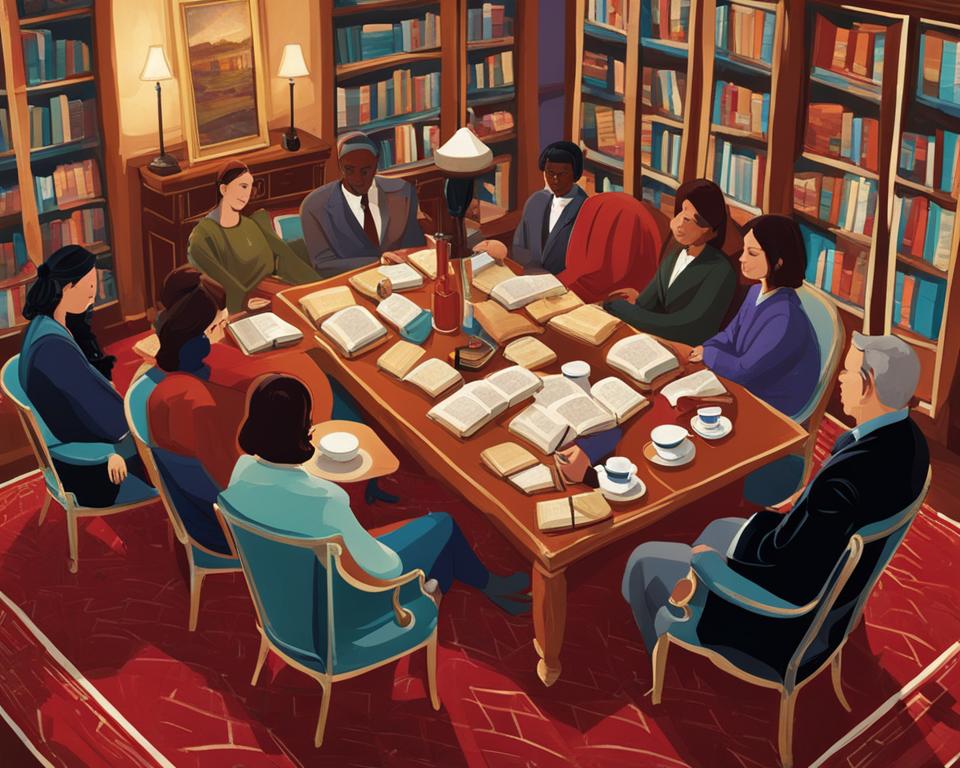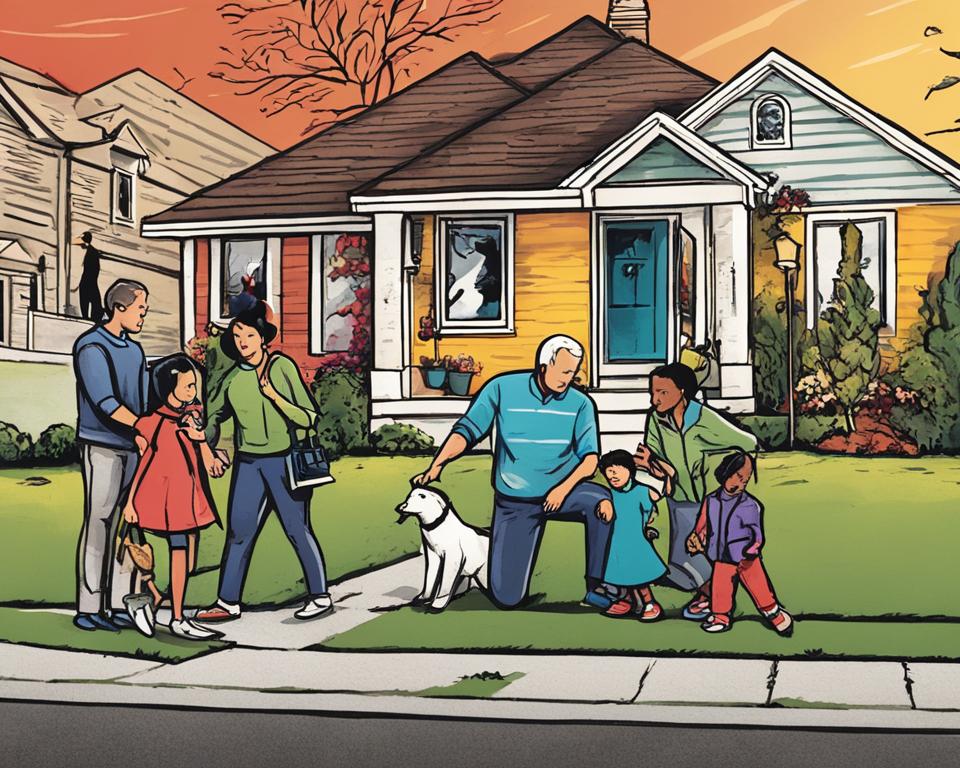“May We Be Forgiven” by A.M. Homes is a darkly comic novel that explores themes of family, redemption, and morality. The audiobook adaptation, narrated by Nathan Osgood, offers a fresh, engaging way to experience this acclaimed work of contemporary fiction. In this audiobook review, we will delve into the story, characters, writing style, and critical reception of “May We Be Forgiven,” as well as the qualities of the audiobook production.
Key Takeaways
- “May We Be Forgiven” by A.M. Homes explores complex themes of redemption, morality, and family dynamics.
- The audiobook adaptation of “May We Be Forgiven” offers an engaging way to experience the story, with excellent narration and production quality.
- The book’s darkly comic nature and unique storytelling style have garnered critical acclaim and numerous awards.
- “May We Be Forgiven” is an excellent choice for readers who enjoy literary fiction that offers insights into the human condition.
- The audiobook experience adds a new dimension to the story, highlighting the importance of delivery and performance in storytelling.
Introduction to “May We Be Forgiven”
“May We Be Forgiven” by A.M. Homes is a darkly comic novel that explores issues of family, morality, and redemption. The story centers around Harry Silver, a middle-aged history professor who experiences a series of tragic and bizarre events that upend his entire life. As Harry navigates various obstacles and personal crises, he confronts the complexities of human relationships and the nature of forgiveness.
The book’s narrative is both poignant and humorous, showcasing Homes’ skillful blend of tragic and comic elements. With its unconventional storyline and unpredictable plot twists, “May We Be Forgiven” offers a unique perspective on modern American life and the challenges of contemporary society.
The audiobook version of “May We Be Forgiven” offers a captivating listening experience, bringing the story to life through expert narration and high-quality production. Whether you’re a fan of Homes’ writing or simply enjoy dark comedies with a touch of satire, “May We Be Forgiven” is a must-read (or must-listen) for anyone seeking a thought-provoking and entertaining tale.
A.M. Homes: The Author Behind “May We Be Forgiven”
A.M. Homes is an accomplished writer, famous for her unique writing style that blends humor, satire, and social commentary. Born in Washington D.C., Homes had a troubled childhood, which she explores in her memoir “The Mistress’s Daughter.” Her debut novel, “Jack,” was published in 1989, followed by several other critically acclaimed works such as “This Book Will Save Your Life,” “Music for Torching,” and “The End of Alice.”
Throughout her career, A.M. Homes has won numerous awards and accolades, including the Women’s Prize for Fiction, the John Dos Passos Prize for Literature, and the National Endowment for the Arts Fellowship.
One of her most notable works is “May We Be Forgiven,” a darkly comic novel that explores the dynamics of family relationships, morality, and human connection. Homes’ unique storytelling approach, marked by a blend of wit, depth, and psychological insight, makes “May We Be Forgiven” a remarkable literary achievement.
| Birth Name | Amy M. Homes |
|---|---|
| Birth Date | December 18, 1961 |
| Education | BA in Writing from Sarah Lawrence College, MFA in Fiction Writing from University of Iowa Writers’ Workshop |
| Notable Achievements | Women’s Prize for Fiction, John Dos Passos Prize for Literature, National Endowment for the Arts Fellowship |
| Notable Works | “May We Be Forgiven,” “This Book Will Save Your Life,” “Music for Torching” |
In summary, A.M. Homes is a distinguished author who has made significant contributions to contemporary literature. Her unique writing style and insightful storytelling make “May We Be Forgiven” an exceptional work of fiction.
Narration and Audiobook Production
For the audiobook version of “May We Be Forgiven,” narrator Nathan Osgood brings A.M. Homes’ darkly comic narrative to life, capturing the unique tone and voice of the book. His smooth and engaging delivery complements the story’s offbeat humor and poignant moments, making for an enjoyable and immersive listening experience.
The audiobook also features a talented ensemble of voice actors, each bringing their own distinct personality and vocal performance to the various characters in the book. The audio production quality is top-notch, with crisp sound quality and seamless transitions throughout the recording.
These factors combined make “May We Be Forgiven” an excellent audiobook choice for those who prefer to listen to their literature. The narration and audio production elevate the storytelling experience, adding an extra layer of depth and immersion to the already captivating narrative.
Plot Summary
In A.M. Homes’s “May We Be Forgiven,” middle-aged history professor Harry Silver finds his life unraveling after a tragic accident that kills his brother George’s wife, Jane. As Harry tries to navigate his own personal turmoil, he becomes involved in the lives of his brother’s children, Nathan and Ashley. The novel explores themes of redemption and family dynamics, as well as darker themes such as violence and infidelity.
“May We Be Forgiven” is a darkly comic exploration of family dysfunction and personal transformation. Homes’s vivid prose brings to life a cast of flawed, complex characters and a narrative that is both provocative and thought-provoking.
Analysis of Themes in “May We Be Forgiven”
Throughout “May We Be Forgiven,” A.M. Homes explores several central themes that drive the narrative forward, leaving readers with much to ponder even after the book has ended. One of the most striking themes of the book is redemption, which is embodied by the main character Harold Silver, a man who has been dealt a series of difficult blows in life and must find a way to recover and make amends for past mistakes.
The book also delves into complex family dynamics, particularly the fraught relationship between Harold and his brother George, which is put under immense strain when Harold begins an affair with George’s wife Jane. Homes explores the tangled web of emotions and betrayals that run through complex family relationships, prompting readers to examine the intricacies of their own family dynamics.
Morality is another central theme of the book, as Homes grapples with the question of what is right and wrong in a world where conventional moral guidelines are often blurred or absent altogether. This is perhaps best exemplified by the character of Jane, who pursues her own desires at the expense of those closest to her, leading the other characters to question their own moral compasses in the process.
Finally, the darkly comic nature of the narrative is another key theme of the book, as Homes deftly weaves humor and irony into even the bleakest of situations, reminding readers that even in the face of adversity, there is always room for laughter. The result is a book that is as thought-provoking as it is entertaining, and one that stays with readers long after the last page has been turned.
Character Development in “May We Be Forgiven”
The characters in “May We Be Forgiven” undergo significant growth and transformation throughout the narrative, carving out a unique space for themselves within the darkly comic world created by A.M. Homes. At the center of the story is Harold Silver, a middle-aged Nixon scholar whose life takes a dramatic and unexpected turn after a series of personal crises.
As Harold navigates his newfound role as a caretaker for his brother’s children, he must confront his own flaws and limitations, gradually learning to embrace a more authentic and compassionate way of being. Meanwhile, his brother George, a successful television executive, undergoes his own journey of self-discovery, as he grapples with the consequences of his actions and seeks redemption.
Through the development of these and other key characters, “May We Be Forgiven” explores themes of family, identity, and personal transformation, inviting readers to reflect on their own journeys of growth and self-improvement.
Writing Style and Language
A.M. Homes’ writing style in “May We Be Forgiven” is notable for its blend of humor, satire, and evocative prose, which creates a vibrant and engaging narrative. Homes is unafraid to push boundaries and challenge readers to think about complex social and moral issues.
“I want to understand people’s darkness, to tap into it, to see it in myself, to acknowledge it and face it.” – A.M. Homes
The language used in the book is both descriptive and thought-provoking, as Homes skillfully creates vivid scenes and imagery with her words. Each character is unique in their speech patterns and vocabulary, which adds depth and authenticity to the story.
Overall, Homes’ writing style and language in “May We Be Forgiven” contribute to the book’s darkly comic tone and engrossing narrative, and make it a must-read for fans of contemporary fiction.
Critical Reception and Awards
The release of “May We Be Forgiven” was met with critical acclaim from numerous respected publications. The New York Times praised the novel for its “darkly comic, yet profoundly moving exploration of family dynamics and redemption.” The Washington Post hailed it as “a masterpiece in contemporary literature,” noting the “bold and innovative use of humor and satirical voice.” Furthermore, “May We Be Forgiven” was the recipient of the prestigious Women’s Prize for Fiction in 2013, solidifying its place as one of the most celebrated works of fiction in recent years.
The critical reception and numerous awards bestowed upon “May We Be Forgiven” are a testament to the power and impact of A.M. Holmes’ writing, which continues to inspire and captivate readers around the world.
Impact and Cultural Significance
The impact of May We Be Forgiven on contemporary literature cannot be denied. A.M. Homes’ biting satire and exploration of complex family dynamics resonated with readers and critics alike, earning the author widespread acclaim and numerous literary honors.
However, the cultural significance of this work extends beyond its literary merit. May We Be Forgiven tackles moral and societal issues that are still highly relevant today, such as the search for redemption, the impact of trauma, and the meaning of family in a changing world.
“Through the lens of the dysfunctional family at the heart of the narrative, Homes deftly dissects the complexities of contemporary American society, from the legacy of violence and the perils of the digital age to the ever-shifting boundaries of personal and collective identity.”
The book has sparked countless discussions and debates, cementing its place as a cultural touchstone and a work that will continue to be studied and appreciated for years to come.
Comparison to Other Works by A.M. Homes
A.M. Homes is a prolific writer with an impressive body of work, exploring a range of themes and styles in her novels and short stories. While “May We Be Forgiven” stands out as a darkly comedic and emotionally charged family drama, many of Homes’ other works share similar themes and narrative approaches.
| Book | Publication Year | Main Themes |
|---|---|---|
| The End of Alice | 1996 | sexuality, morality, taboo |
| Music for Torching | 1999 | suburban ennui, infidelity, family struggles |
| This Book Will Change Your Life | 2002 | social satire, self-help, romance |
| The Mistress’s Daughter | 2007 | identity, family, adoption |
One of the key similarities between “May We Be Forgiven” and other Homes’ works is her ability to blend humor with darkness and emotional depth. “The End of Alice” explores taboo themes such as pedophilia and murder, but Homes’ distinct writing style allows readers to find humor, humanity, and even tenderness in these characters’ lives.
Similarly, in “Music for Torching,” Homes delves into the complexities of suburban life and the struggles of marriage, presenting a darkly comic and bleak view of contemporary domesticity while also highlighting the flawed humanity and tenderness of her characters.
“This Book Will Change Your Life” showcases Homes’ talent for social satire and sharp wit, exploring contemporary culture and the self-help industry while also providing a heartfelt and humorous account of one man’s struggle to find meaning in his life.
“The Mistress’s Daughter” presents a more personal and introspective narrative, as Homes reflects on her own experiences of being adopted and discovers the truth about her birth parents. Like “May We Be Forgiven,” this book deals with themes of identity, family, and redemption, but with a more personal and memoiristic approach.
Overall, A.M. Homes’ works exhibit a unique blend of satire, humor, and emotional depth, exploring a range of themes and genres while retaining her distinctive voice and style.
Recommendations for Fans of “May We Be Forgiven”
If you enjoyed “May We Be Forgiven,” here are some other books with similar themes and styles that you might enjoy:
| Book Title | Author | Similar Themes |
|---|---|---|
| “The Corrections” | Jonathan Franzen | Family dynamics, dark humor |
| “Middlesex” | Jeffrey Eugenides | Identity, redemption, family secrets |
| “White Noise” | Don DeLillo | Cultural critique, postmodernism, dark humor |
If you enjoyed Homes’ writing style and would like to explore more of her work, we recommend “This Book Will Save Your Life,” which also combines dark humor with poignant insights into the human condition.
Impact of the Audiobook Experience
Experiencing “May We Be Forgiven” in audiobook format can have a profound impact on the reader. The narration elevates the story, bringing the characters to life with expert voice acting and a compelling delivery. By listening to the audiobook, readers can immerse themselves fully in the world of the story, creating a more vivid and memorable experience.
The audiobook production quality is also a significant factor in the impact of the audiobook experience. The sound design, music, and pacing can contribute to a more engaging and emotionally resonant experience than simply reading the book. The production can make the story feel more cinematic and immersive, bringing the listener closer to the action and emotions of the characters.
For those who struggle to find time to read, audiobooks can provide a convenient and accessible way to enjoy literature. With the ability to listen while commuting, exercising, or completing other tasks, audiobooks offer a way to fit reading into a busy schedule. This flexibility can also make the audiobook a more inclusive format, allowing those with vision impairments or reading difficulties to also enjoy the story.
Overall, the impact of the audiobook experience on “May We Be Forgiven” should not be underestimated. It offers a unique and compelling way to experience the story, bringing readers closer to the characters and themes of the book in a way that traditional print formats cannot achieve.
Reader Reviews and Testimonials
What do readers think of “May We Be Forgiven”? Here are some selected reviews and testimonials:
| Review | Rating |
|---|---|
|
5/5 stars |
|
4/5 stars |
|
4.5/5 stars |
These reader reviews and testimonials showcase the impact and resonance of “May We Be Forgiven” with a diverse range of audiences.
Discussion and Book Club Questions
Whether you’re reading “May We Be Forgiven” on your own or in a book club, these discussion points can help you delve deeper into the themes and ideas presented:
- What does the book say about the nature of family and how it can both support and harm individuals?
- What role does forgiveness play in the narrative, and how is it portrayed?
- Consider the use of humor and satire throughout the book. How does this affect the overall tone and message of the story?
- What do you think the author is saying about the morality of our actions, particularly in relation to the consequences that follow them?
- Discuss the use of technology throughout the book. How does it impact the characters and their relationships with each other?
These are just a few of the many possible discussion points that “May We Be Forgiven” can spark. As you explore the book further, you may find even more questions to ask and topics to explore.

Conclusion
In conclusion, “May We Be Forgiven” by A.M. Homes is a darkly comic, thought-provoking novel that explores complex themes of redemption and family. The audiobook adaptation is a compelling and immersive experience, with skilled voice actors and high production quality. Homes’ writing style is both humorous and poignant, and the book’s critical reception and awards speak to its literary merit.
For fans of Homes’ work or those interested in contemporary literature, “May We Be Forgiven” is a must-read. The audiobook format adds an extra layer of depth to the experience, and reader testimonials attest to the book’s impact and resonance. Book clubs and discussion groups will appreciate the thought-provoking themes and questions posed by the narrative, and the audiobook’s narration and production quality make it an excellent choice for group listening.
In summary, our audiobook review of “May We Be Forgiven” recommends this book as a compelling and engaging read that will leave a lasting impression on listeners. Whether you’re a fan of dark comedy, literary fiction, or simply looking for an immersive and thought-provoking experience, “May We Be Forgiven” is a book you won’t want to miss.
FAQ
What is the book "May We Be Forgiven" about?
“May We Be Forgiven” is a darkly comic novel written by A.M. Homes that explores themes of redemption and family. It follows the story of Harry Silver, a Nixon scholar whose life takes a dramatic turn after a series of unexpected events.
Who is the author of "May We Be Forgiven"?
“May We Be Forgiven” is written by A.M. Homes, an acclaimed American author known for her distinctive storytelling style and thought-provoking narratives.
What is the audiobook version of "May We Be Forgiven" like?
The audiobook of “May We Be Forgiven” features excellent narration and high production quality. The voice actors bring the story to life, making it an engaging and immersive listening experience.
Can you provide a brief plot summary of "May We Be Forgiven"?
“May We Be Forgiven” follows Harry Silver, a middle-aged Nixon scholar, whose life unravels after he becomes involved in a series of bizarre events. The novel explores his quest for redemption and the turbulent relationships within his family.
What are the main themes in "May We Be Forgiven"?
“May We Be Forgiven” delves into themes of redemption, family dynamics, morality, and the darkly comedic nature of life. It explores the complexities of human relationships and the search for meaning and forgiveness.
How are the characters developed in "May We Be Forgiven"?
The characters in “May We Be Forgiven” undergo significant development throughout the novel. They grapple with personal challenges, confront their flaws, and experience transformative journeys that shape their relationships and identities.
What is the writing style and language like in "May We Be Forgiven"?
A.M. Homes employs a compelling writing style in “May We Be Forgiven,” blending humor, satire, and evocative prose. Her language is sharp and insightful, capturing the complexities of human emotions and societal issues with wit and depth.
How was "May We Be Forgiven" received by critics and readers?
“May We Be Forgiven” garnered critical acclaim, with reviewers praising A.M. Homes’ storytelling prowess and her exploration of compelling themes. The book received several awards and accolades, solidifying its reputation as a noteworthy literary work.
What impact does "May We Be Forgiven" have on contemporary literature?
“May We Be Forgiven” has made a significant impact on contemporary literature, tackling relevant societal and moral issues with its dark humor and insightful commentary. The book has sparked discussions and resonated with readers around the world.
How does "May We Be Forgiven" compare to other works by A.M. Homes?
In comparison to other works by A.M. Homes, “May We Be Forgiven” showcases her recurring themes of flawed characters, dark humor, and an exploration of family dynamics. However, each of her works has its unique qualities and narrative approach.
Can you recommend other books for fans of "May We Be Forgiven"?
If you enjoyed “May We Be Forgiven,” you may also appreciate other works with similar themes and writing styles. Some recommendations include “The Corrections” by Jonathan Franzen, “Middlesex” by Jeffrey Eugenides, and “The Family Fang” by Kevin Wilson.
What impact does the audiobook experience have on "May We Be Forgiven"?
Experiencing “May We Be Forgiven” in audiobook format enhances the storytelling experience. The narration and audio production bring the characters and their journeys to life, immersing listeners in the darkly comic world of the book.
What do readers say about "May We Be Forgiven"?
Readers have provided positive reviews and testimonials for “May We Be Forgiven.” Many appreciate the book’s thought-provoking themes, well-developed characters, and A.M. Homes’ unique storytelling style.
Are there discussion points or book club questions for "May We Be Forgiven"?
Yes, for readers interested in deeper engagement with “May We Be Forgiven,” there are discussion points and book club questions available. These prompts encourage thought-provoking conversations about the themes and ideas presented in the book.



